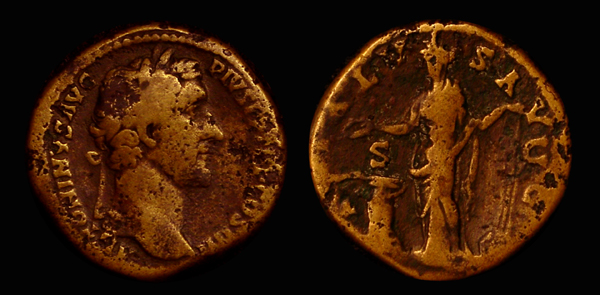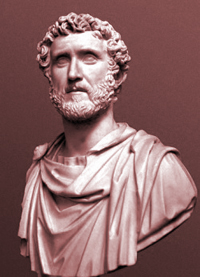
Sestertius - IMP ANTONINUS PIOUS
(RIC 784)
Antoninus Fulvus Pius
Born: A.D. 86
Emperor: A.D. 138-161
Obverse: Portrait laureate head right - ANTONINVS AVG PIVS PP TRP COS IIII
Reverse: Salus standing right with rudder and globe feeding serpent rising from alter- SALVS AVG S-C
|
Inscriptions: ANTONINVS AVG(ustus) PIVS P(ater) P(atriae) TR(ibunica) P(otestate) COS (Consul) IIII / S(enatus) C(onsultus) Antoninus Augustus Dutiful, Father of his country, Tribune of the people, Four times Consul of the Senate. / The Goddess Salus (goddess of safety, well-being, welfare, health and prosperity of both the individual and the state) Augustus - By the authority of the Senate After the death of his father, Antoninus was brought up under the care of Arrius Antoninus, his maternal grandfather. Both were men of integrity and culture having held consulships. Not much is known of his young life but it can be assumed that with the likes of family friends such as Pliny the Younger he was under the best tutelage. Along with good looks and a kind disposition he grew into a well respected and well educated man who was well versed in the matters of empire with a relative respect for those around him. After a term as consul in 120 he went as proconsul to Asia where he governed with distinction. Holding many offices under Trajan and Hadrian he showed he was a man of considerable talents and he was adopted by the emperor Hadrian on the condition that he would adopt Marcus Aurilius and Lucius Verus as his sons and heirs. On succeeding Hadrian he remained a humble man choosing to live and conduct his life much the same way he always had as a private citizen and it is commonly believed he administered the empire with marked ability and integrity. His reign was the longest since Augustus which may have been made possible by a strong empire under able leadership leading to relative peace and contentment with few internal or external conflicts and his relative good temperament and fair minded policies and actions. Indeed he is said to have been proud of the fact that few had died because of acts against him and those few who did, did so through the actions of the senate and not by his decree. Of Antoninus Julius Capitolinus states: "With such care did he govern all peoples under him that he looked after all things and all men as if they were his own." This fairness and kindness showed in his marked disdain of the use of informers and treason trials, his monetary policies and social policies which were both conservative and fair. His general good nature and respect for human life might have earned him the name 'Pius' or it may have been his aid to those who faced death under unfair rulings, but the name fits this rare emperor who seemed to be lacking the common imperial traits of ambition and cruelty. His reign was comparatively peaceful; there were several military disturbances throughout the Empire in his time, in Mauretania, Iudaea, and amongst the Brigantes in Britannia, but none of them are considered serious and any military actions he took were through legates. Unlike his predecessor he was not a highly visible emperor choosing not to travel extensively for foreign relations or war. Italy was embellished with fine buildings though he did not spend much on lavish new building projects choosing instead to improve, repair or finish existing projects though during his reign the Wall of Antoninus was built in Britain. Under Antoninus the provinces were eased of much of their financial burden because of reduced spending. He died in peace at Etruria not far from Rome of a fever and was deified. His name would become synonymous with 'Good Emperor' since his nephew and successor Marcus Aurelius would also bear this name. The name Antoninus would be adopted by many successive emperors (most who shared none of his good qualities) wishing to associate themselves with the reign of this rare good emperor. His wife was Faustina, aunt of Marcus Aurelius. He was succeeded by Marcus Aurelius. |

